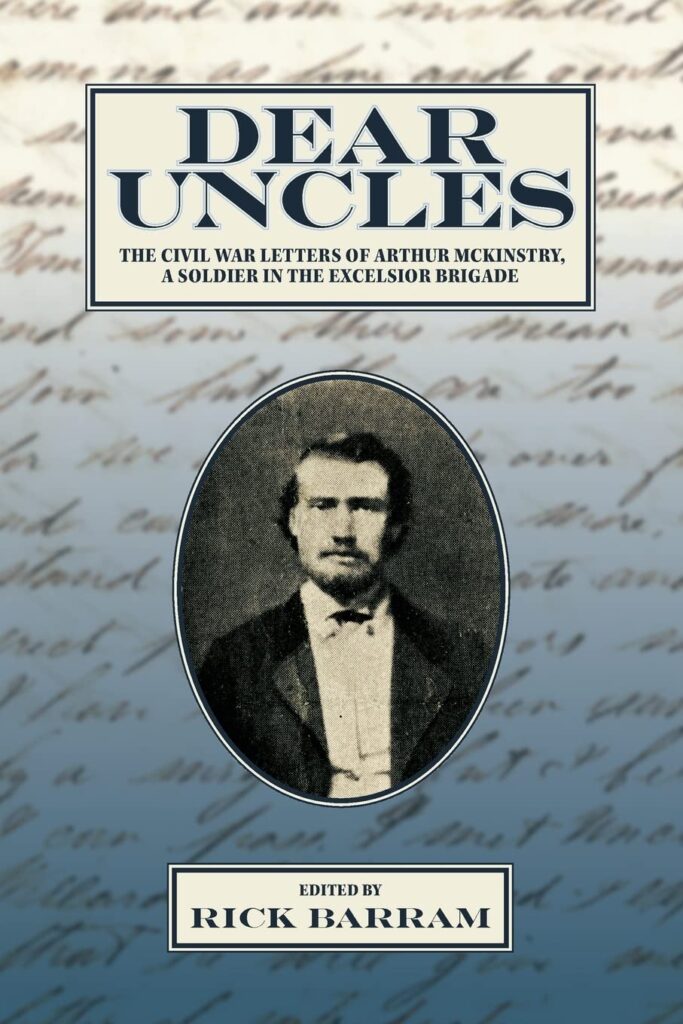When 21-year-old Arthur McKinstry left Chautauqua County, N.Y., in early June 1861 to join the Excelsior Brigade being raised by then-Colonel Daniel Sickles, he was better prepared to write than fight. Upon reaching the unit’s camp of instruction on Staten Island, Arthur wrote to his mother revealing that his Uncle Willard had given him “a portable ink stand and all sorts of stationery and writing materials,” to take along, “in order…I might keep him posted as to our movements.”
His uncle had an ulterior motive, however. Willard, and Arthur’s uncle Winthrop, owned and operated the Fredonia Censor, a local weekly newspaper. They intended to publish Arthur’s letters. What better way to enlighten and attract new readers?
Rick Barram, a retired history teacher, brings Arthur’s Censor letters—preserved at the Darwin R. Barker Historical Museum in Fredonia, N.Y.—“into the light,” and also includes a second collection of letters—from Mississippi State University—that Arthur wrote to his mother and other relatives. Dear Uncles presents these letters “in their entirety…,” Barram notes, “to understand the full scope of Arthur’s experiences.”
Arthur’s letters became a staple of the Censor’s war coverage, appearing in a column headed Dear Uncles.
Nearly six dozen additional “letters, reports, and letters not written by Arthur” also appear in Dear Uncles. They pop up as sidebars throughout the book. Barram titles these supplements “Other Voices,” intended “to provide context and otherwise illuminate Arthur’s writings and experiences.”
Arthur was uniquely prepared for his role as correspondent. “Articulate and well read,” at age 15 he entered the U.S. Naval Academy in the fall of 1854. He quickly squandered his time there, however. Amassing demerits for misconduct, and ranking near the bottom of his class academically, Arthur was judged “unfit” and dismissed.
Perhaps as atonement for his failures at Annapolis, Arthur was early to answer the call to arms when Civil War flared. Mustered into the 3rd Regiment of the Excelsior Brigade, later designated the 72nd New York Infantry, the regiment patrolled the Lower Potomac River by the fall of 1861.
Arthur’s letters mirror the youngster’s experiences in the first flush of soldiering. He frequently recounts the relentless grind of drilling and picket duty. He often comments on the weather, and more often about the food. “[T]he average of our men do not get enough to satisfy hunger…,” he writes facetiously. “On the whole, we do not fare quite as well as State prison convicts…”
Arthur occasionally spices his writing with his opinions about camp mates and officers. “Our regiment is a choice one,” he claims, “but over on the right of camp are the ‘roughs’ from the city. They are a rascally set and we keep a constant guard which effectually prevents thefts.”
Even Dan Sickles, now a brigadier, fails to escape a double-edged assessment. He “displayed great energy and patriotism in the raising and equipment of the brigade,” writes Arthur. “He has governed it however in a civilian manner…evidently incompetent to personally maneuver the brigade.”
Arthur grew to relish his journalist role. “I find that it is a very nice thing to be the correspondent of the Censor for I notice that the officers had rather have a good word there rather than a bad one,” he wrote. “Take it all together I am about as well off as a private can be.”
His writing would benefit his comrades from time to time. At their urging “to state the facts,” Arthur exposed a sutler who “practices a system of extortion upon the soldiers of the Brigade.”
Little more than a month later, Arthur was able to report, “We have a new sutler here and he is more reasonable than the old.”
Arthur was a keen observer. Little escaped his notice. He could be prescient, writing in December 1861: “I really think, from the present appearance of things, that this war will eventually prove the death blow of Slavery.”
He also wrote with prescience to the Censor on May 4, 1862, beginning his letter, “My time is extremely short…” Hours later, Arthur’s pen was stilled forever when he was killed at the Battle of Williamsburg, “shot through the leg and groin.”
Arthur was pleased when an officer called him a “writing man.” But even Arthur cautioned his readers, “It would be tedious to tell of all the shifts we soldiers make…” This can be a cautionary tale for readers of Dear Uncles.
There is much here that will appeal to readers; at times perhaps too much. For example, by alternating between verbatim letters Arthur wrote to his uncles, with letters he wrote to his mother and others, typically at or near the same time, his comments are often repeated and duplicated.
To this mix Barram embeds two categories of notes throughout the text. These are meant to define or explain “foreign words” and other references that Arthur is prone to use. Such notes appear repeatedly, and impart a choppiness to the flow of narrative.
In the final chapter, and a concise epilogue, Barram provides a brief history of the Excelsior Brigade with interesting information about “the fate of Arthur’s mates.” Numerous photographs, maps, and illustrations further enhance the text.
Dear Uncles offers a bounty of information particularly to students of the Excelsior Brigade. The book also provides a unique glimpse of the often-overlooked actions along the Lower Potomac River early in the war.
“[R]eaders of the Fredonia Censor,” writes Barram, “were able to follow the adventures of their Chautauqua County boys thanks to Arthur McKinstry and his uncles.” Readers of Dear Uncles are now able to follow Arthur McKinstry’s tales thanks to the efforts of Rick Barram.

Dear Uncles
The Civil War Letters of Arthur McKinstry, A Soldier in the Excelsior Brigade
Edited by Rick Barram, Excelsior, 2023
If you buy something through our site, we might earn a commission.




